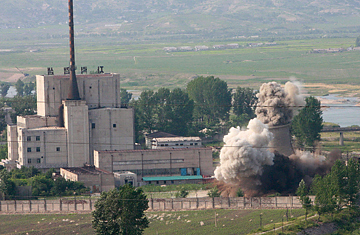
The cooling tower of North Korea's Yongbyon nuclear complex is demolished on June 27, 2008
The two-sentence statement, straightforward and clear as a bell, came from the North Korean foreign ministry on Aug. 26. "We have decided to immediately discontinue the disablement of our nuclear facilities that has been under way in accordance with the Oct. 3 [6-party] agreement. We will consider taking actions to quickly restore the Yongbyon nuclear facilities at the strong request of our related institutions." (Read: the North Korean military.)
And in Seoul and in Washington, the reaction was the same. Not: 'Oh no! What do we do now? The North has pulled out of the nuclear deal!' But rather: 'Here we go again...'
It isn't literally true that diplomats in international capitals who have to deal with Pyongyang are those that draw the shortest straw. But it probably should be. No deal with the North is ever set in stone. And so it is again with the agreement Kim Jong Il signed last year to disable his nuclear bomb-making equipment and get rid of the nukes that Pyongyang has already produced — between 6 and 10, according to notoriously inaccurate CIA estimates. The government did disable the Yongbyon reactor, its key source of nuclear fuel, and blew up its cooling tower with the world's cameras rolling in June. But negotiations are never over with the North, and its latest actions — the threat to reverse those steps — illustrate that.
Diplomats in Seoul and Washington believe this latest tantrum comes for two very specific reasons. In return for finally providing what was supposed to be a full accounting of its nuclear facilities and bombs earlier this summer, the Bush administration said it would, among other things, take North Korea off its list of state sponsors of terror. Pyongyang, sources say, was led to believe that the formal delisting would come August 11 — a deadline that has come and gone. U.S. and South Korean officials have said privately that the delay is a result of disagreements over how, exactly, the North's compliance with the nuclear deal is to be verified.
Last month, Christopher Hill, the United States chief envoy to the so-called Six Party Talks, had expressed optimism that disputes over verification would be resolved within 45 days. "We don't see any obstacles to getting that done," Hill said publicly back then. But others involved in the negotiations were taken aback by his optimism. South Korea's envoy, Kim Sook, said the verification negotiations would be difficult. "I am not optimistic at all about what's ahead," said Kim, "especially as implementing the verification guideline is a very difficult job where we need to coordinate the different position and interests of the six parties."
Score one for South Korean realism. Christopher Hill's deputy, Sung Kim, had been in Beijing earlier this month for talks with the North about the verification process, but according to a State Department spokesman, as of Aug. 25 there was still no deal. One of Seoul's top North Korea watchers, Cheong Seong-chang, Director of Inter-Korean Relations Studies Program at the Sejong Institute, says, "The North Korean military is reacting strongly against the rigorous verification demand." In particular, he adds, it rejects U.S. demands for impromptu inspection and inspection of other sites unmentioned by the North in the allegedly complete nuclear declaration it handed over earlier this summer. There is, moreover, no wiggle room whatsoever on this issue between the North Korean military's high command and Kim Jong Il. Their interests, Cheong says, are completely aligned.
The State Department, for its part, is doing what the State Department always does: It's working the problem. The Chinese have offered a compromise plan on verification that is now under scrutiny in Washington. Though anti-nuclear deal hawks remain in the Bush administration, and are adamantly opposed to meeting in the middle, Pyongyang has a vote, too, and it votes to stop complying. With his time running out, and his desire for a deal with North Korea obvious, most analysts expect another compromise from President Bush. And then — bet on it — watch Kim Jong Il angle for a better deal with whomever the next President is.
— With reporting by Stephen Kim / Seoul
